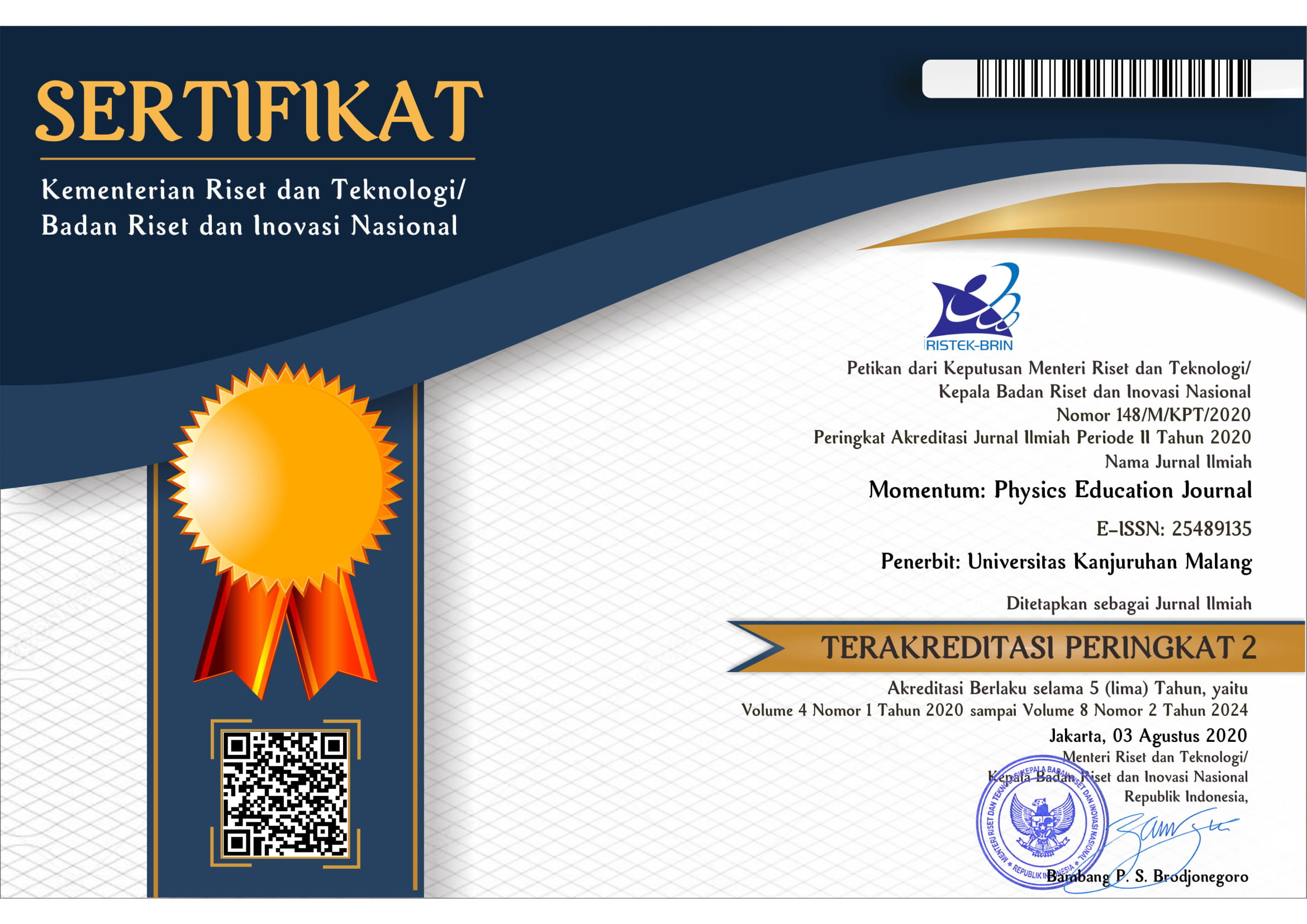Student Cognition in the Context of a Climate System: Global Warming and Greenhouse Effect
DOI:
https://doi.org/10.21067/mpej.v3i2.3739Keywords:
student cognition, climate system, global warming, the greenhouse effectAbstract
Education needs to emphasize more attention to environmental issues. The school is an active place to provide actual knowledge, skills, attitudes, and behavior towards environmental issues such as global warming dan the greenhouse effect. This study aimed to investigate seventh-grade students' cognition in the context of a climate system. This study was descriptive, involving the collection of qualitative data. These qualitative data were then analyzed for their content inductively to identify concepts and patterns of student responses. This study indicated that students believed that global warming caused by six factors involving the greenhouse effect, depletion of the ozone layer, fossil fuel usage, forest fires, use of chemicals, and industrial air pollution. Also, they convinced six segments of the global warming impacts: ocean, soil, air, plants and animals, humans, and weather and season changes. The student thought about the climate system was substantially linear, where the contribution of human activities caused global warming that finally have an impact on humans themselves.
Downloads
References
Andersson, B., & Wallin, A. (2000). Students’ understanding of the greenhouse effect, the societal consequences of reducing CO2 emissions and the problem of ozone layer depletion. Journal of Research in Science Teaching, 37(10), 1096–1111. https://doi.org/10.1002/1098-2736(200012)37:10<1096::AID-TEA4>3.0.CO;2-8
Bélanger, P. (2003). Learning environments and environmental education. New Directions for Adult and Continuing Education, 2003(99), 79–88. https://doi.org/10.1002/ace.112
Calderon, J. L. (2011). How-to data collection series: The evolution of the focused discussion group--from non-participant to one of the crew. Qualitative Report, 16(1), 308–311. Retrieved from http://login.ezproxy.library.ualberta.ca/login?url=http://search.ebscohost.com/login.aspx?direct=true&db=eric&AN=EJ914051&site=eds-live&scope=site
Creswell, J. W. (2012). Educational research: Planning, conducting, and evaluating quantitative and qualitative research (4th ed.). Boston: Pearson Education, Inc.
Dewi, J. K., Hendarti, L., Matakupan, S., & Lisdiyanta, T. (2012). Suplemen Pembelajaran Perubahan Iklim untuk Guru (Climate Change Learning Supplements for Teachers). Jakarta: Kementeran Lingungan Hidup.
Global Education Monitoring. (2016). Pendidikan bagi manusia dan bumi : France.
Inaotombi, S., & Mahanta, P. C. (2018). Pathways of socio-ecological resilience to climate change for fisheries through indigenous knowledge. Human and Ecological Risk Assessment: An International Journal, 24, 1–13. https://doi.org/10.1080/10807039.2018.1482197
Johnson, R. B., & Christensen, L. B. (2013). Educational research: Quantitative, qualitative, and mixed approaches (5 edition). Thousand Oaks, Calif: SAGE Publications, Inc.
Koulaidis, V., & Christidou, V. (1999). Models of students’ thinking concerning the greenhouse effect and teaching implications. Science Education, 83(5), 559–576. https://doi.org/10.1002/(SICI)1098-237X(199909)83:5<559::AID-SCE4>3.0.CO;2-E
Kress, G. R., Jewitt, C., Ogborn, J., & Tsatsarelis, C. (2014). Multimodal teaching and learning : the rhetorics of the science classroom. London: Bloomsbury. Retrieved from https://books.google.co.id/books/about/Multimodal_Teaching_and_Learning.html?id=2QxCBAAAQBAJ&redir_esc=y
Ocal, A., Kisoglu, M., Alas, A., & Gurbuz, H. (2011). Turkish prospective teachers’ understanding and misunderstanding on global warming. International Research in Geographical and Environmental Education, 20(3), 215–226. https://doi.org/10.1080/10382046.2011.588504
Österlind, K. (2005). Concept formation in environmental education: 14â€Âyear olds’ work on the intensified greenhouse effect and the depletion of the ozone layer. International Journal of Science Education, 27(8), 891–908. https://doi.org/10.1080/09500690500038264
Papadimitriou, V. (2004). Prospective primary teachers’ understanding of climate change, greenhouse effect, and ozone layer depletion. Journal of Science Education and Technology, 13(2), 299–307. https://doi.org/10.1023/B:JOST.0000031268.72848.6d
Pruneau, D., Gravel, H., Bourque, W., & Langis, J. (2003). Experimentation with a socio-constructivist process for climate change education. Environmental Education Research, 9(4), 429–446. https://doi.org/10.1080/1350462032000126096
Rajeev Gowda, M. V., Fox, J. C., Magelky, R. D., Gowda, M. V. R., Fox, J. C., & Magelky, R. D. (1997). Students’ Understanding of Climate Change: Insights for Scientists and Educators. Bulletin of the American Meteorological Society, 78(10), 2232–2240. https://doi.org/10.1175/1520-0477-78.10.2232
Schreiner, C., Henriksen, E. K., & Kirkeby Hansen, P. J. (2005). Climate Education: Empowering Today’s Youth to Meet Tomorrow’s Challenges. Studies in Science Education, 41(1), 3–49. https://doi.org/10.1080/03057260508560213
Serafin, R., Heikes, B., Sargeant, D., Smith, W., Takle, E., & Wakimoto, R. (1991). Study on observational systems: A review of meteorological and oceanographic education in observational techniques and the relationship to national facilities and needs. Bulletin of the American Meteorological Society. Retrieved from https://lib.dr.iastate.edu/ge_at_pubs/206
Shepardson, D. P., Niyogi, D., Choi, S., & Charusombat, U. (2009). Seventh grade students’ conceptions of global warming and climate change. Environmental Education Research, 15(5), 549–570. https://doi.org/10.1080/13504620903114592
Shepardson, D. P., Niyogi, D., Roychoudhury, A., & Hirsch, A. (2012). Conceptualizing climate change in the context of a climate system: implications for climate and environmental education. Environmental Education Research, 18(3), 323–352. https://doi.org/10.1080/13504622.2011.622839
Stevenson, R. B. (2007). Schooling and environmental/sustainability education: from discourses of policy and practice to discourses of professional learning. Environmental Education Research, 13(2), 265–285. https://doi.org/10.1080/13504620701295650
Svihla, V., & Linn, M. C. (2012). A Design-based approach to fostering understanding of global climate change. International Journal of Science Education, 34(5), 651–676. https://doi.org/10.1080/09500693.2011.597453
Tolppanen, S., & Aksela, M. (2018). Identifying and addressing students’ questions on climate change. The Journal of Environmental Education, 49(5), 375–389. https://doi.org/10.1080/00958964.2017.1417816
Downloads
Published
How to Cite
Issue
Section
License
Copyright (c) 2019 Momentum: Physics Education Journal

This work is licensed under a Creative Commons Attribution-ShareAlike 4.0 International License.


.png)
.png)
.png)
.png)




